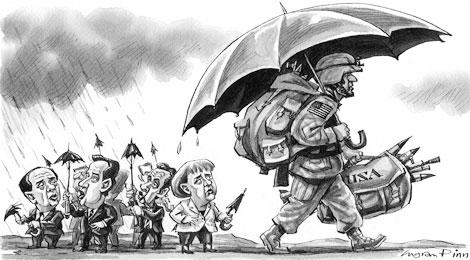
From Michael Moran, the GlobalPost: With little fanfare outside a muted flag folding ceremony in Wiesbaden, Germany, the final American division in Europe — the U.S. 1st Armored Division, which fought its way from North Africa to the Italian Alps during the war — packed up and left for its base at Fort Bliss, Texas, in May.
Still based in Europe at the moment are four Army “Brigade Combat Teams,” three in Germany and a fourth in Vicenza, Italy. The lighter, more deployable BCTs emerged from a major reform of the army’s force structure in the past decade and number about 3,500-strong, compared to the 10,000-12,000 soldier divisions they replaced. One of those four — likely one of the Germany-based BCTs, will be withdrawn in 2012.
The result will be an enormous change from the days when encountering American soldiers on leave or liberty in Europe was routine. Cold War U.S. troop strength in Europe, which peaked in 1962 at nearly 277,000 soldiers, remained well over 200,000 until the early 1990s. Under current plans, resisted by a military leadership increasingly resigned to the deep cuts coming in the years ahead, will cut European based troops from 42,000 today to 37,000 by 2015.
There was a time when such a proposal would ensure a united phalanx of Republicans, along with some hawkish Democrats, lining up to label any Democratic president who dared suggest such cuts as soft on defense. But the old lines have shifted, and cutting defense spending is one of the very few things — along with the color of the sky and the likelihood of the sun rising — that unites liberals and Tea Party Republicans. . . .
The General Accountability Office, a nonpartisan arm of Congress, reinforced this in a 2010 report that predicts “it will potentially cost between $1 billion and $2 billion more from fiscal years 2012-2021 to keep the two brigades in Europe than it would cost to return them to the United States. . . .”
“The blunt reality,” recently retired Defense Secretary Robert Gates told his European counterparts in the spring, “is that there will be dwindling appetite and patience in the U.S. Congress — and in the American body politic writ large — to expend increasingly precious funds on behalf of nations that are apparently unwilling to devote the necessary resources or make the necessary changes to be serious and capable partners in their own defense.” (graphic: Ingram Pinn/Financial Times)
Image: ft%204%2016%2011%20Ingram%20Pinn%20Yanks%20going%20home_0.jpg
